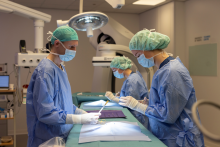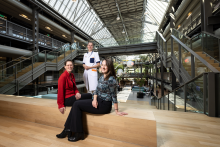‘Have you already thought of a radio station?’ The two students in the operating room of the TechMed Centre answer with a cautious smile. On the operating table, two battered pig’s legs lie ready to be stitched. ‘Let’s go with ‘Het Foute Uur’ on Qmusic’. After one final check, the technical medicine students get started. ‘I’m shaking like crazy’, one of the two says. ‘Do you want a short break?’, the teacher asks. A silence follows. ‘I’m not sure if that will help.’
Tension
The assessment with which students of Technical Medicine conclude the Surgical Skills course is an exciting test for most of them. They have to anesthetise, cut and suture. All actions are simulated as accurately as possible. The students are fully dressed in operating suits, have to wash their hands thoroughly and are faced with strict protocols. In fact, the only difference is the pig's leg that replaces a human arm.
‘Students are tense prior to the assessment’, says assistant professor Frank Halfwerk. He is assessor in the operating room where the students have to stitch. ‘Students are very demanding of their own actions. If they fail to succeed during the assessment, emotions sometimes run high.’ But if they can get past that and pass the assessment, they are ready for the real deal, the lecturer knows. ‘Before students set foot in the hospital, we make them competent in a simulated environment. That is our motto.’


Confidence
According to Halfwerk, practising in such an environment is necessary. He mentions Black Wednesday, the first Wednesday in August when English newly trained doctors start working. Research has shown that the mortality rate in British hospitals is six percent higher that day. ‘Also in the Netherlands, medicine students often learn their skills on real patients in the hospital. In our opinion, this is no longer fitting in the twenty-first century.’
Halfwerk explains that the unique feature of Twente’s approach is the simulation of the entire surgical cycle with the patient at the core. ‘In ten weeks’ time, students learn the pre-operative policy, the hygiene beforehand, the anaesthetic and the surgery, as well as the contact with the patient afterwards. Basically, they learn everything involved, which is unique in the world. When I tell people about it at conferences, they just don’t believe it.’
By practising in a simulated environment, the students’ confidence in their own skills noticeably increases, says Halfwerk. This has been shown by recent research by the UT. In this study, more than 80 technical medical students were questioned about their confidence in their own surgical skills. ‘After the course, students have much more confidence in their own actions, according to the study. Think about taking the informed consent, handling various instruments and closing the skin. That’s why after this course, we can send students off to work in a hospital with peace of mind.’


Simulation
Not only medicine students benefit from the skills lab. Vascular surgeons in training can also practice surgery in the TechMed Centre, says Halfwerk. ‘This used to be done on the patient. Here we can fully simulate a bypass operation, for example.’ But experienced surgeons can also practice their skills at the University of Twente, the lecturer continues. ‘There are operations that do not occur very often in practice, and simulation offers a solution in such cases. Here, surgeons can practise on a 3D printed model of the heart as often as they want.’
Back to the skills lab in the TechMed Centre. In the operation room, the students thread the last piece of wire through the fresh pig’s legs. ‘What do you think of the result?’, Halfwerk asks. The student takes a quick look at the suture. ‘Actually, I'm not completely satisfied.’ In the corridor, two students are catching their breaths after their assignment. ‘The suturing is the most difficult part’, says Carmen den Drijver, Master’s student in Technical Medicine. ‘We were both shaking quite a bit.’
Fellow student Merel Reuvekamp nods. ‘I’ve been practising at home on a butcher’s pig’s leg, but it’s still exciting.’ According to both students, the course is a good preparation for their upcoming internships. ‘If I can succeed here, I can also do it in hospital. Now let’s hope that today was good enough.’








